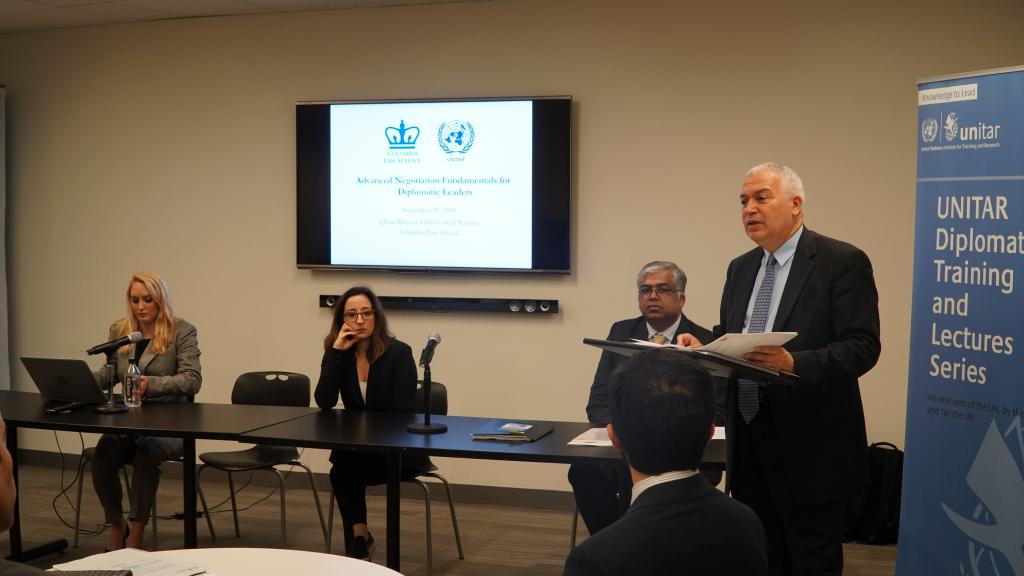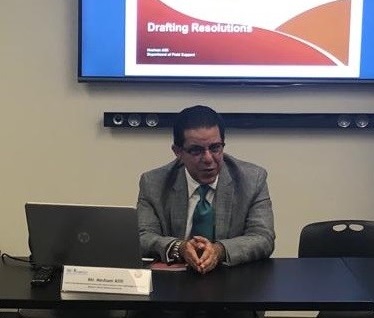UNITAR Conducts Training for Qatari Diplomats
 15 September, 2018, New York, United States - The United Nations Institute for Training and Research (UNITAR) held a five-day training course on “Strengthening Knowledge and Skills in Multilateral Diplomacy” for the new delegation from Qatar.
15 September, 2018, New York, United States - The United Nations Institute for Training and Research (UNITAR) held a five-day training course on “Strengthening Knowledge and Skills in Multilateral Diplomacy” for the new delegation from Qatar.
The training started on 10 September 2018 with the opening address by Mr. Marco Suazo, Head of UNITAR New York Office. First day was a daylong training on multilateral negotiation technique by Professor Alexandra Carter, Clinical Professor of Law and the Director of the Mediation Clinic at Columbia Law School. The morning session was conducted by Professor Carter through lectures and exercise on active listening skills, short-term and long-term negotiation, interest-based negotiation, and listening exercises. The afternoon session was more of interactive, participative, and roleplay by the delegates on advanced negotiation exercise, situational and environmental factors that impact dispute resolution, and leadership and negotiation.
 n 11 and 12 September, the delegates attended the ‘Briefing for delegates on the 73rd Session of the General Assembly and the Main Committees for FOSS Members’. The session on 13 September was started by Mr. Otto Gustafik, Former Senior Political and Intergovernmental Affairs Officer in the Economic and Social Council (ECOSOC) Affairs Branch of the UN Department for General Assembly and Conference Management (DGACM). He described the UN charter, mentioned the items to be considered at Plenary Meeting in the General Assembly and the work process of 2nd and 3rd Committee.
n 11 and 12 September, the delegates attended the ‘Briefing for delegates on the 73rd Session of the General Assembly and the Main Committees for FOSS Members’. The session on 13 September was started by Mr. Otto Gustafik, Former Senior Political and Intergovernmental Affairs Officer in the Economic and Social Council (ECOSOC) Affairs Branch of the UN Department for General Assembly and Conference Management (DGACM). He described the UN charter, mentioned the items to be considered at Plenary Meeting in the General Assembly and the work process of 2nd and 3rd Committee.In the afternoon session, Dr. Bela Hovy, Chief of Migration, United Nations mentioned that evidence of migration is essential to avoid misunderstanding. He outlined the definitions of an international migrant and methods of how international migration can be measured. He further pointed to the causes of migration including economic inequalities. Key opportunities for migration and development such as remittances, diaspora contributions to countries of origin and contribution to destination countries were highlighted. Mr. Firas Kayal, Senior Policy Advisor, UNHCR mentioned about the causes of migration and psychology of refugees. He pointed out the financial constrain to meet up the needs of the refugees. Finally, he mentioned about their analytical survey report on displaced people that they want to go back to their own countries.
 The next day was opened by Dr. Roy S. Lee, Professor at Yale University School of Forestry and Environmental Studies and former Executive Secretary for the United Nations Diplomatic Conference of Plenipotentiaries on the Establishment of an International Criminal Court; former Director of the Division for the codification and development of international law, UN Office of Legal Affairs; former Secretary of the International Law Commission; and former Secretary of the Sixth (Legal) Committee of the General Assembly. He provided a historical overview and background of the United Nations Charter and the Qatari diplomats benefitted from his deep knowledge of the Rules of Procedure of the General Assembly. Dr. Roy discussed about formal and informal meetings, and mentioned about the importance of informal meetings. The different responsibilities of the General Assembly and the Security Council were discussed, and specific Rules of Procedure of the General Assembly analyzed and clarified. The diplomats from Qatar were highly engaged in the topic following up with further applicable case studies.
The next day was opened by Dr. Roy S. Lee, Professor at Yale University School of Forestry and Environmental Studies and former Executive Secretary for the United Nations Diplomatic Conference of Plenipotentiaries on the Establishment of an International Criminal Court; former Director of the Division for the codification and development of international law, UN Office of Legal Affairs; former Secretary of the International Law Commission; and former Secretary of the Sixth (Legal) Committee of the General Assembly. He provided a historical overview and background of the United Nations Charter and the Qatari diplomats benefitted from his deep knowledge of the Rules of Procedure of the General Assembly. Dr. Roy discussed about formal and informal meetings, and mentioned about the importance of informal meetings. The different responsibilities of the General Assembly and the Security Council were discussed, and specific Rules of Procedure of the General Assembly analyzed and clarified. The diplomats from Qatar were highly engaged in the topic following up with further applicable case studies.
The afternoon module was led by Mr. Hesham Afifi, Chief of the Reimbursement Policy and Liaison Section in the Department of Field support in the United Nations Secretariat and focused on Diplomatic Report Writing. He began by outlining the main considerations of communication including the purpose of the correspondence, the type, sender and recipient, the level of confidentiality and precedence. He continued by providing general guidelines for drafting resolution and providing helpful insights into technical questions.
 The five-day training programme was concluded successfully, as the various sessions fully achieved its objectives of preparing and enabling participants to successfully describe their functions; gain an overview of critical issues to the work of the Main Committees; effectively engage in discussions on subject matters relevant to their respective committees; and become sensitized to the special procedures and dynamics of each committee. At the end, each of the delegates received certificates for successful completion of the learning session.
The five-day training programme was concluded successfully, as the various sessions fully achieved its objectives of preparing and enabling participants to successfully describe their functions; gain an overview of critical issues to the work of the Main Committees; effectively engage in discussions on subject matters relevant to their respective committees; and become sensitized to the special procedures and dynamics of each committee. At the end, each of the delegates received certificates for successful completion of the learning session.
Photo 1: Head of UNITAR New York Office H.E. Mr. Marco Suazo opening the induction course for the Qatari diplomats.
Photo 2: Professor Alexandra Carter of Columbia Law School, leading the first interactive exercise during the first day of the clinic.
Photo 3: Mr. Hesham Afifi, Chief of the Reimbursement Policy and Liaison Section in the Field Budget and Finance Division of the Department of Field Support, discussing diplomatic report writing and resolutions, rules and procedures and drafting.
Photo 4: Head of UNITAR New York Office H.E. Mr. Marco Suazo with the Qatari diplomats in the Security Council.

